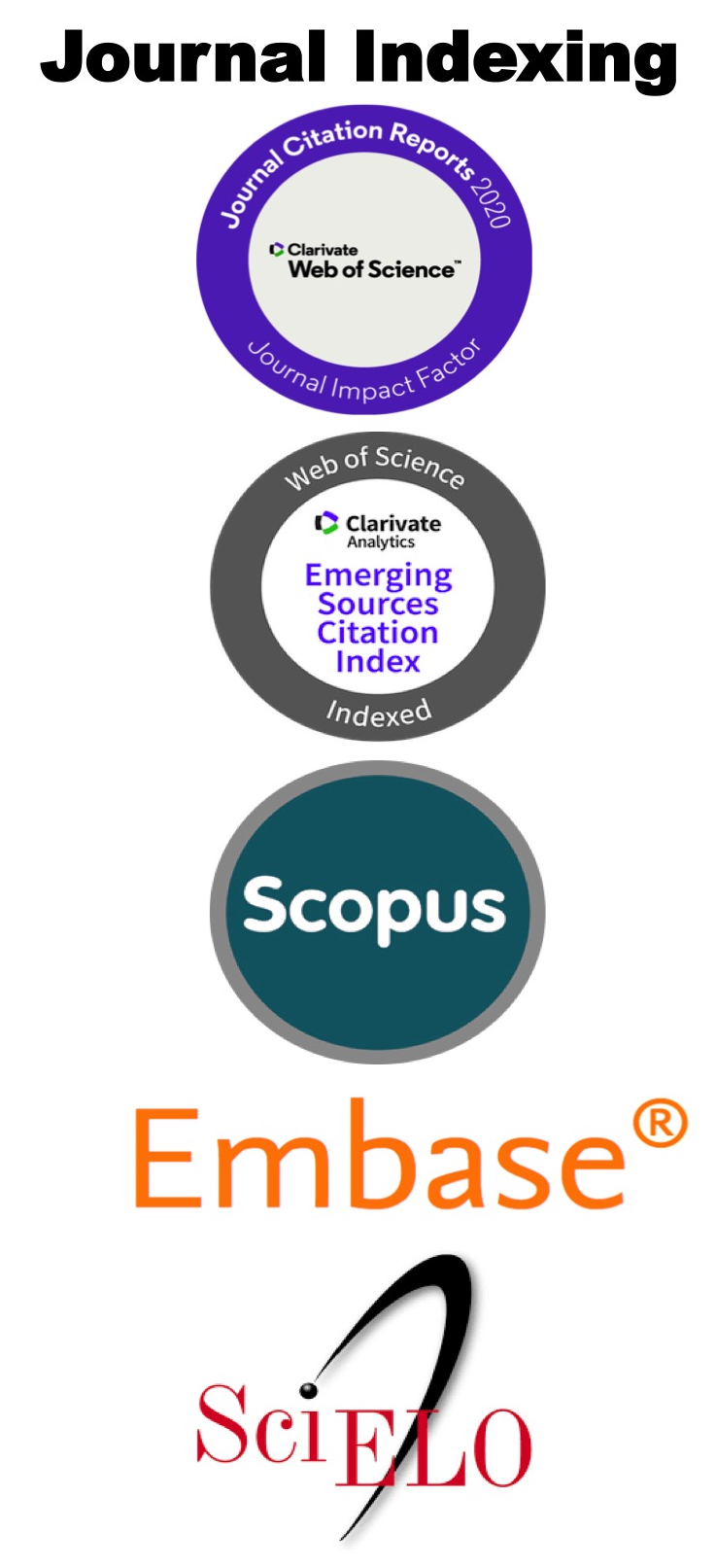Worse Caries Experience Does Not Lead to Worse Overall Health
Keywords:
Dental Caries, Periodontitis, Hypertension, Mental Disorders, Oral HealthAbstract
Objective: To analyze caries experience depending on periodontitis affection concomitant or not with cardiovascular risks or mental health issues with the hypothesis that worse accumulated caries experience is not necessarily the result of the presence of concomitant overall health issues. Material and Methods: All subjects of this cross-sectional study were participants of the Dental Registry and DNA Repository project. Variables age, ethnicity, sex, caries experience, periodontitis and mental disease statuses and blood pressure assessment, dental clinical data (DMFT, DMFS and periodontitis) were evaluated and collected from the clinical records. We used chi-square, Fisher’s exact, or Student’s t-tests to determine differences in frequencies of sex, age, ethnicity, and dental clinical data depending on caries experience, periodontitis, mental health status, and cardiovascular risks. The established alpha was 5%. Results: Of the total 1,437 subjects included in this study, 407 were individuals with high blood pressure and 1,030 were individuals without high blood pressure. Also, 558 were individuals with mental disease and 879 were individuals without mental disease. High blood pressure patients were mostly men (47.17%) and women were the majority when analyzing patients with mental illness (60.04%). Most of the patients in the different groups were white, with a mean age ranging from 15.4 to 88 years. Conclusion: We concluded that caries experience concomitant or not with periodontitis affection does not associate with high blood pressure and mental disease.
References
Chapple ILC, Bouchard P, Cagetti MG, Campus G, Carra MC, Cocco LN, et al. Interaction of lifestyle, behavior or systemic diseases with dental caries and periodontal disease: consensus report of group 2 of the joint EFP/ORCA workshop on the boundaries between caries and periodontal diseases. J Clin Periodontol 2017; 44(Suppl 18):39-51. https://doi.org/10.1111/jcpe.12685
Kim JK, Baker LA, Davarian S, Crimmins E. Oral health problems and mortality. J Dental Sciences 2013; 8(2):115-20. https://doi.org/10.1016/j.jds.2012.12.011
Barnett ML. The oral-systemic disease connection: An update for the practicing dentist. JADA 2006; 137(Suppl):5S-6S. https://doi.org/10.1080/01944360608976719
Paizan MLM, Vilela-Martin JF. Is there an association between periodontitis and hypertension? Curr Cardiol Rev 2014; 10(4):355-61. https://doi.org/10.2174/1573403x10666140416094901
Tsakos G, Sabbah W, Hingorani AD, Netuveli G, Donos N, Watt RG, et al. Is periodontal inflammation associated with raised blood pressure? Evidence from a National US survey. J Hypertens 2010; 28(12):2386-93. https://doi.org/10.1097/HJH.0b013e32833e0fe1
Han H, Park JB. Clinical implication of fasting glucose and systolic/diastolic blood pressure on the prevalence of periodontitis in non-diabetic and non-hypertensive adults using nationally representative data. Exp Ther Med 2018; 16(2):671-8. https://doi.org/10.3892/etm.2018.6260.
Office of the Surgeon General. Center for Mental Health Services. National Institute of Mental Health. Mental health: A report of the Surgeon General. Pittsburgh, PA: US Department of Health and Human Services, US Public Health Service 1999.
Dewa CS. The costs of mental disorders in the workplace: Can they be decreased? Sante Ment Que 2017; 42(2):31-8. https://doi.org/10.7202/1041912ar
Djordjević V, Jovanović M, Miličić B, Stefanović V, Dejanović SD. Prevalence of dental caries in hospitalized patients with schizophrenia. Vojnosanit Pregl 2016; 73(12):1102-8. https://doi.org/10.2298/VSP150917111D
World Health Organization. Oral Health Surveys: Basic Methods. 4th ed. Geneva: WHO; 1997.
Papapanou, PN, Sanz, M, Buduneli N, Dietrich T, Feres M, Fine DH, et al. Periodontitis: Consensus report of Workgroup 2 of the 2017 World Workshop on the Classification of Periodontal and Peri-Implant Diseases and Conditions. J Periodontol 2018; 89(Suppl 1): S173-S182. https://doi.org/10.1111/jcpe.12946
Kisely S. No Mental Health without Oral Health. Can J Psychiatry 2016; 61(5):277-82. https://doi.org/10.1177/0706743716632523
Velasco-Ortega E, Monsalve-Guil L, Ortiz-Garcia I, Jimenez-Guerra A, Lopez-Lopez J, Segura-Egea JJ. Dental caries status of patients with schizophrenia in Seville, Spain: a case-control study. BMC Res Notes 2017; 10:50. https://doi.org/10.1186/s13104-016-2368-9
McGarvey EL, Leon-Verdin M, Killos LF, Guterbock T, Cohn WF. Health disparities between Appalachian and non-Appalachian counties in Virginia USA. J Community Health 2011; 36(3):348-56. https://doi.org/10.1007/s10900-010-9315-9
Manji F, Dahlen G, Fejerskov O. Caries and periodontitis: contesting the conventional wisdom on the their aetiology. Caries Research 2018; 52(6):548-64. https://doi.org/10.1159/000488948
Hugoson A, Sjödin B, Norderyd O. Trends over 30 years, 1973–2003, in the prevalence and severity of periodontal disease. J Clin Periodontol 2008; 35(5):405-14. https://doi.org/10.1111/j.1600-051X.2008.01225.x
Downloads
Published
How to Cite
Issue
Section
License
Copyright (c) 2021 Pesquisa Brasileira em Odontopediatria e Clínica Integrada

This work is licensed under a Creative Commons Attribution-NonCommercial 4.0 International License.



